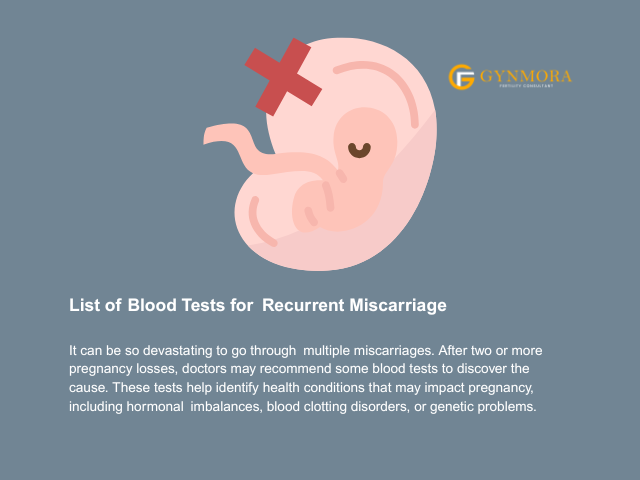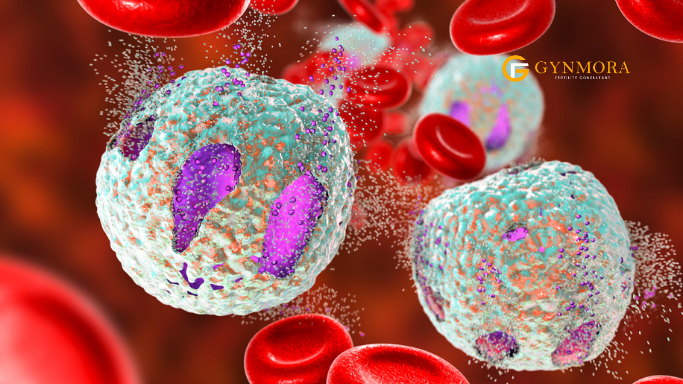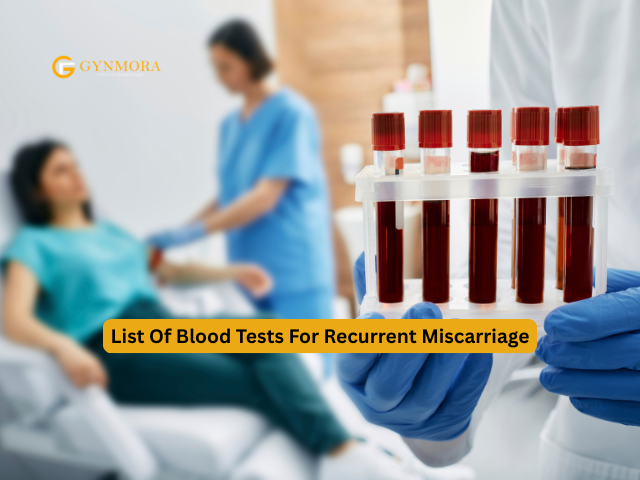List of Blood Tests for Recurrent Miscarriage

It can be so devastating to go through multiple miscarriages. After two or more pregnancy losses, doctors may recommend some blood tests to discover the cause. These tests help identify health conditions that may impact pregnancy, including hormonal imbalances, blood clotting disorders, or genetic problems.
Understanding Recurrent Miscarriages?

Recurrent miscarriage is defined as losing two or more pregnancies consecutively. A variety of factors can play into this, ranging from a genetic issue to a hormonal problem and even to an immune system issue.
These blood tests help to detect the causes of recurrent miscarriage as well as help in planning subsequent pregnancies. Doctors recommend multiple blood tests for recurrent miscarriage.
Here is a List of Blood Tests For Recurrent Miscarriage.
Hormonal Blood Tests

Hormonal functions These hormones have vital importance in pregnancy. An imbalance can cause pregnancy loss. Some necessary tests include:
a) THYROID FUNCTION TEST (TSH, T3, T4)
- Check for the functioning of the thyroid gland
- If your thyroid gland is over or under-active, it can lead to miscarriage.
b) Progesterone Test
- Assesses progesterone, which is a hormone essential for pregnancy maintenance.
- Progesterone deficiency can cause abortion.
c) Prolactin Test
- Very high prolactin can influence ovulation and pregnancy.
- Aids in Identifying Hormonal Disorders
Blood Clotting Tests (Thrombophilia Tests)

Certain blood clotting disorders prevent appropriate blood flow to the baby and cause miscarriage. These tests test for clotting problems:
a) Test for Antiphospholipid Antibody Syndrome (APS)
- Identifies immune system issues that lead to blood clots during pregnancy.
b) Lupus Anticoagulant Test
- Determines whether the immune system is attacking the body’s tissues, thereby increasing the risk of miscarriage.
c) Factor V Leiden mutation analysis
- Recognizes inherited blood clotting diseases
Genetic Blood Tests

In some cases, it is the genetic problems of the parents or the baby that result in miscarriages.
a) Karyotyping Test
- Looks at the abnormal chromosomes of both parents
b) Fetal Chromosomal Analysis
- This test looks for genetic problems with the baby if miscarriage tissue is available.
Immune System Tests

Pregnancy is supposed to be supported by the immune system; instead, sometimes, the immune system attacks the developing baby.
a) Test for Natural Killer (NK) Cells
- Quantifies the function of immune cells that may threaten the pregnancy.
ANA Test OR Antinuclear Antibodies Test
- Immunological tests for autoimmune diseases that may lead to miscarriage.
Blood Sugar and Insulin Tests
- Diabetes that isn’t controlled or insulin resistant has a higher risk of miscarriage.
a) Fasting Blood Sugar Test
- That’s tracking sugar levels in order to spot diabetes
b) Insulin Resistance Test
- It reveals whether the body has problems using insulin, something that can have an impact on pregnancy.
Why These Tests Are So Necessary
Let’s identify the specific reasons for recurrent miscarriages; these blood tests play a crucial role. Only when doctors understand what is behind a miscarriage can they suggest appropriate treatment to improve the chances of a successful pregnancy in the longer term.
What Happens After the Tests?
- In case of hormonal imbalance, medication may be given.
- If a bleeding problem is found, medicines such as aspirin or heparin may be given to thin their blood.
- Genetic counseling may be recommended if genetic issues are found.
- Specialized specialist treatment can be provided if they are diagnosed with an immune disorder.
FAQ
How many miscarriages does it take to be termed recurrent?
Recurrent miscarriage is when you experience 3 or more early miscarriages (even if you have successful pregnancies in between).
What is the primary reason for recurrent miscarriage?
Genetic variations, hormonal factors, and blood clotting problems are the leading causes.
So, how do we avoid recurrent miscarriages?
Yes! Doctors can then recommend solutions to increase the likelihood of a healthy pregnancy.
How much do these tests cost?
The price ranges, but some Insurance may cover it with the location and medical facility.
When do I need to consult a physician for a miscarriage?
See a fertility specialist for further assessment if you have experienced two or more miscarriages.
Real-Life Stories Of Recurrent Miscarriage
Many women suffered multiple miscarriages, and it was a harrowing journey. These true accounts can provide comfort in knowing that you are not alone and will inspire you to look forward to a brighter tomorrow.
My Story of Losing Three Pregnancies
Pregnancy Loss: ‘I Was Grateful When My Baby Was Born Eventually’ A Woman Opens Up About Losing Three Pregnancies Before Having A Healthy Baby. In addition, she discusses the journey of pain, stress, and hope to achieve final functioning.
Read her Full Story: Miscarriage Association
I had Three Miscarriages Before Seeing A Specialist
The woman had suffered three miscarriages, and it took doctors to refer her to a specialist. Meditation Process After experiencing hopelessness for three years, she received appropriate medical treatment and had a baby.
Read Her Full Story: Tommy’s
A Women’s Story of Recurrent Pregnancy Loss
This woman experienced multiple miscarriages. Doctors did many tests to see what was wrong. She discusses her medical treatment and her baby-related efforts.
Read Her Full Story: Yale Medicine
Stories Of Hope After Miscarriage
We have heard stories from so many women who have lost their babies and gone on to become pregnant again and have feelings of hope. These stories demonstrate that though miscarriage is often devastating, the possibility of a baby in the future remains.
MORE ON MISCARRIAGE: Miscarriage Hope Desk
Miscarriage Stories: You Are Not Alone
Women share their miscarriage experiences. They aim to give people the sense that they are not alone and that others are with them in this experience.
Read their stories: Undefining Motherhood
Final Words
It’s devastating to go through more than one loss, but you’re not alone. Many women have fought the same difficult battle and gone on to have healthy pregnancies. If this is you, please get in touch with a doctor or get help.
Overall Purpose
Causation implies strength and substantial causation means intense treatment, and yet recurrent miscarriage can be a time when the most seamless blood tests can be undertaken to deduce causation and guide treatment. But if you can detect the problem early, the chances of a healthy pregnancy are much higher. If you or anyone you know has multiple miscarriages, it is advisable to consult a doctor. GYNMORA To help you in this Journey Of Parenthood!
Disclaimer
Note: The information in this article is just for educational purposes. It is not medical advice. Speak with a doctor if you have experienced a number of miscarriages to receive the most effective treatment. Everyone is different, and one individual may have something practical that is not possible for another individual.
Thank You

We know how emotionally challenging it is to have multiple miscarriages. At GYNMORA, we are here to give you the right direction and support.
Seek advice from your healthcare professional to treat your symptoms or those you know going through this process.
However, we care about your health and your health during your subsequent pregnancy!




Review Shocking These 7 Test Can Reveal The Cause: List Of Blood Tests For Recurrent Miscarriage.